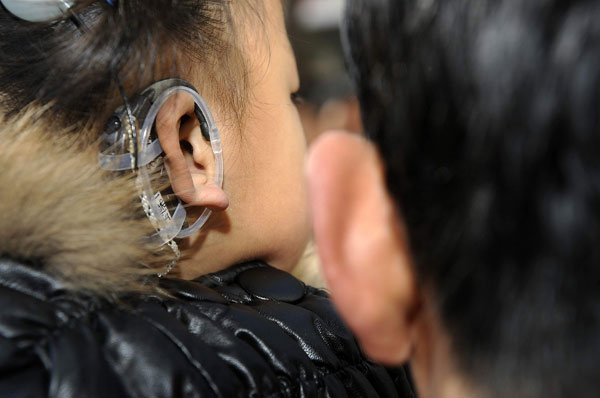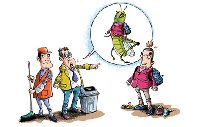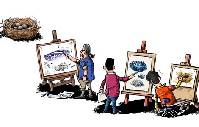Feel-good stories ask questions of us all
|
 |
|
On the same day, in the Chinese city of Yinchuan, a 114-hour citywide search came to fruition when the missing external piece of a very expensive hearing aid belonging to a 4-year-old girl was found. Photo by Li Ran / Xinhua |
Apart from truthfulness, timing is an important factor. Altruism is never out of time, but there is a time for specific arrangements. For example, if the San Francisco Batkid affair preceded the release of a new Batman movie, some might have interpreted it as a promotional gimmick for the movie. Likewise, if the local government in Yinchuan had been embroiled in some kind of charity scandal of late, its call for action to help the girl would have been met with mistrust or even derision.
There was a key difference between the US story and the Chinese one. For Miles Scott, the San Francisco mayor took part in the climax of the mass excitement and US President Barack Obama sent words of encouragement. For the Chinese girl, only the official platforms were used, but not officials themselves. Isn't the citywide search for the hearing aid the best illustration of the Lei Feng spirit, which the government so eagerly promotes?
My guess is, the story developed impromptu and without the vetting of certain personnel so that nobody high up was aware of its publicity potential. This is certainly positive in terms of results because the story had a naturalness to it that endeared it to a mass audience. Had it been embellished with an “official” coating, it might have sounded too pompous and exaggerated for public taste. For there have been many precedents where an uplifting true story was stripped of its authentic details and moved up into the grotesque realm of the morality tale.
Then there was the absence of official participation. Apart from the time lapse due to unpreparedness, local officials may have had misgivings that their presence would have been seen as insincere and a mere attempt to hog the credits. If so, this was the right move. Good Samaritanism should not be a government project. It should be encouraged by the government — with certain measures to protect those who perform it, which are being implemented across China right now — but ultimately it is a civic duty shared by all and performed with utmost willingness but not necessarily with fanfare.
Clearly, not every child who needs help can receive exposure of this scale. The Scott boy and the Song girl luckily stumbled into moments of generosity brought forth by many factors, some of which were beyond anyone's control. If a local newspaper printed a story of one such kid every day, people would quickly grow tired and categorically ignore these stories. But there are more than 365 such kids in one city alone. So, a one-off stunt might make us feel good, but it will not solve all the problems in such cases.
That's where philanthropy as a system should kick in. It's wonderful that we share this collective experience of doing good, which makes us feel good. But it should not just be moments of bleeding-heart explosions, but rather, long-term simmering of empathy that keeps our society warm for anybody caught in misfortune. And that includes kids who may not be so cute or whose maladies may not be dramatized in soap operas and popular novels.
A good system of philanthropy should be able to spread goodwill in a more scientific manner, counteracting the public tendency to heap attention on one high-profile target and ignore the rest. Meanwhile, people should learn that small acts of kindness may not always form a torrent, but remain trickles that seep into the daily lives and keep all of us nourished and flowering in the garden of humanity.
Finally we have to go beyond charity and examine the economic system and the healthcare industry to make sure the net does not have giant holes in it through which whole sections of society may fall. Fairness means the lucky must help the unlucky so that the bulk of society stays firm. Only when the system prevents most people, including kids with severe medical conditions, from reeling in desperation will our dramatic outpouring of compassion be a reminder of who we are and what we can be when we stand together.
For more X-Ray, here
























